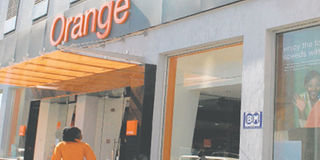Why public debate on rivalry in telecom sector is necessary

A Telkom Orange customer care shop in Nairobi. PHOTO | FILE | NATION MEDIA GROUP
What you need to know:
The Kenyan market study was benchmarked on the European framework, often recognised as an example of global best practice.
The consultants believe the EU framework is consistent with the Kenyan law and regulations and forms a good reference for reviews.
The study was undertaken as the CA could not legally declare mobile phone and data service Safaricom dominant without technical due diligence.
Telkom also has issues on money transfer, including approvals by the Central Bank.
On June 6, the High Court quashed the amendments made on December 15, 2015 to the Kenya Information and Communications Act of 2015, on the basis that they stripped the Communications Authority of Kenya (CA) of its independence as envisaged by Article 34 (5) of the Constitution.
This is a significant milestone for the CA and other independent institutions.
They should now execute their legal mandates without any meddling from the Executive.
The CA should use this opportunity to clean up the poor regulatory environment that today prevails in the sector.
TECHNICAL REPORT
The starting point should be a stakeholders’ public debate of the report by Analysys Mason, the London firm retained by the CA for a telecommunication competition market study in Kenya.
The draft report dated March 20 has been released to the main operators for their comments.
In my view, the public should also get the gist of the thrust of this highly technical report.
The Kenyan market study was benchmarked on the European framework, often recognised as an example of global best practice.
PROMOTION
The consultants believe the EU framework is consistent with the Kenyan law and regulations and forms a good reference for reviews.
The review was based on the Kenya Information and Communications Act (KICA), 1998 (as amended in 2013 and 2015) and Competition Act, 2010 (with 2012 and 2014 amendments).
The CA has powers under KICA, which include:
(1) The promotion of competition (Section 23(2)(b);
(2) In determining which licensees are “dominant in a relevant market” (Section 84W).
SAFARICOM
The study was undertaken as the CA could not legally declare mobile phone and data service Safaricom dominant without technical due diligence.
It concluded that Safaricom is dominant. It states in part:
“The market analysis concludes that Safaricom is dominant in both the mobile communications and mobile money markets.
In both of these markets Safaricom enjoys, and has enjoyed for a long time, a very high market share (above 80 per cent in value).
Our assessment of other qualitative criteria (barriers to entry, economics of scale and scope, etc.) confirms the fact that Safaricom is able to behave independently of its competitors.”
DOMINANT
The CA should, therefore, declare Safaricom Ltd dominant. This has important implications in promoting competition. Under the EU framework, the “asymmetric” termination charge across networks is common practice.
This is where the dominant player is required to pay a slightly higher charge per call or SMS terminated in the smaller players’ networks.
Although the players pay a little less per call or SMS terminated in the dominant network, traffic volumes ensure that the dominant player still makes more money on cross network traffic but this arrangement promotes competition.
If we are to benchmark with the EU, the CA must insist on this “asymmetric” practice for enhanced competition.
DEBATE
There is a need for public debate of the Analysys Mason report. Telkom Kenya, for instance, has unveiled a new look and strategy, dropping the Orange brand, but it is banking on fair competition.
Telkom also has issues on money transfer, including approvals by the Central Bank.
As we have argued before, M-Pesa (and other money transfer businesses) should be separate entities, licensed and regulated by the CBK and not the CA, which has no capacity to handle money matters.
VALUABLE
Then there is the case of a second tier operator, Jamii Telecommunications Ltd, which has been allocated the highly valuable (in terms of signal penetration) 700 MHtz spectrum, a prefix number and permission to operate without paying licence fees for a one-year trial period.
Jamii has now effectively become a first-tier operator. Without proper ground rules, the sector could descend into chaos as Jamii tears into the small first-tier operators.
This has happened elsewhere, especially in India.
Mr Ngugi is a consultant in public affairs and policy. [email protected]





